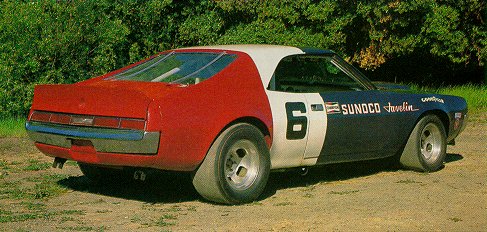|
Back in the day
when pony cars ruled the street, Trans Am racing was the place to
build credibility for your product. A sedan racing series started by
the SCCA in 1966, the series’ full name was the Trans-American Sedan
Championship. In those days, TA racing consisted of the
under 2 liter class, contested by Alfa’s and other small Euro
sedans, and the over 2 liter class. The first race was won by Jochen
Rindt driving an Alfa-Romeo. The over 2-leter class winner, and
second overall, was Bob Tullius, driving a Dodge Dart.
As the sixties waned, the series really took off, with entries from each of the big three. Coming late to the party, and making up for the disaster that was the Marlin, little American Motors introduced their Javelin as a 1968 model, and went racing right off the bat. While they didn’t win any races that first season, they did finish 2nd in a number of races, thanks to spirited drives by George Follmer and Peter Revson, in Javelins painted red, white and blue.
In their second year of Trans Am, AMC moved backwards through the field, as Follmer and Revson went elsewhere – the former to some considerable success driving Ford Mustangs in the series – but he’d be back. Driving duties were taken over by the aforementioned Tullius and a roster of other drivers, including the retuning female due of Janet Guthrie teamed with Liane Engeman. These two lady drivers had caused some controversy in a Javelin at the 12 Hours of Sebring in 1968. Paul Hawkind, leading the race in a Ford GT40 swerved to avoid the erratically- driven Javelin and crashed out of the race when he hit a Porsche.
For the 1970 Series,
AMC opened up its checkbook and hired the Penske Racing
organization, and their driver / engineering whiz-kid, Mark Donohue.
The blue portions of the car painted a deeper blue than in ’68 and
’69, they remained a distinctive three-color scheme. Peter Revson
returned to the team in 1970, as well, and all the pieces seemed to
be in place. However, the team lost the Tran Am championship to
Parnelli Jones by only 1 point. The following year, Penske and
Donohue would make good on AMC’s investment.
Before the 1971 season, Chrysler withdrew its
financial backing and the Barracuda and Challenger vanished from the
1971 entry lists. Driver Jerry Titus was fatally injured the
previous year, taking the heart of
Penske, decided to gamble with only one driver, Donohue. He sold his old Javelins to the American Racing Associates (ARA) team, who picked up the cast-off Peter Revson as their number one pilot. It paid off, as Donohue and Penske won the driver’s and manufacturer’s championships. Their mission accomplished, Penske and Donohue went on to tackle Indy, Can Am and F1, where Donohue died when a tire blew.
In 1972, the field largely decimated by the
loss of most of the factory teams, ARA racing and George Follmer
went on to make it two in a row for the
Javelin.
|
|
Visit Our Forums |
|
Autopuzzles is chock-full o’ articles and commentary on cars, old and new alike. The puzzles are refreshed often throughout the month; feature articles are monthly.
Marque Spotlight: AMC
|





